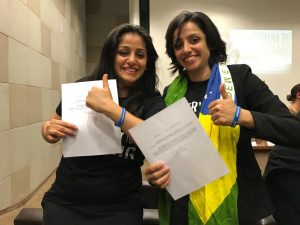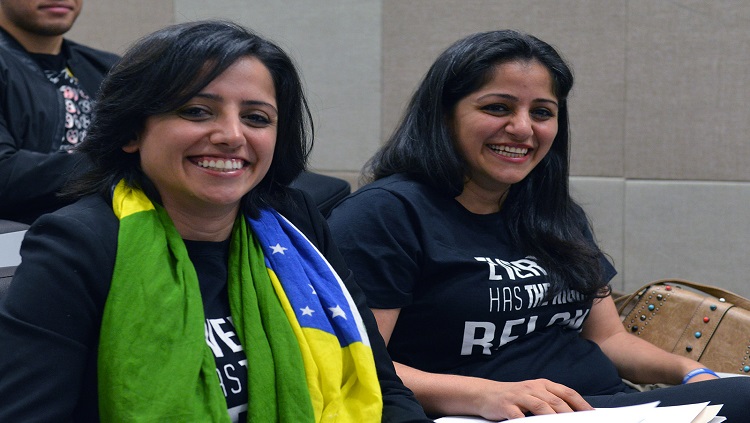São Paulo – The sisters Maha and Souad Mamo were given Brazilian nationality this Thursday (4) by the Ministry of Justice at an event during the 69th session of the Executive Committee of the United Nations High Commissioner for Refugees (UNHCR), in Geneva, Switzerland. Last June, they had been the first stateless persons recognized as Brazilian citizens. The naturalization papers were presented by the coordinator-general of Brazil’s National Committee for Refugees (CONARE), Bernardo Laferté, and by ambassadress Maria Nazareth Farani Azevêdo, who’s Brazil’s permanent representative with the UN in Geneva.
The event was considered a historic moment by Brazilian authorities. “In bestowing Brazilian nationality on sisters Maha and Souad Maho, Brazil reaffirms its tradition of welcoming the vulnerable and unassisted, setting an example and proving to the world that it has been and always will be a country committed to ending statelessness,” a Justice Ministry communiqué quoted minister Torquato Jardim as saying.
The new Migration Law, in effect since November 2017, comprises a special section on protection of stateless persons, which provides for residence and simpler naturalization procedures. “Thank you so, so much! I can’t believe it, it’s a dream come true for a country such as Brazil to make someone’s dream a reality. This Law is not just for show, it has really been put to work. Thank you so much!,” the communiqué quoted Maha Mamo as saying.
According to Bernardo Laferté, whose grandfather was stateless, this is the latest step against statelessness in the country’s laws. “The commitment began with the adoption of two forms of original nationality, through land and through blood, and now it this been extended to recognized stateless persons through a simpler naturalization process,” he said.

Maha and her siblings were unable to get nationality in Lebanon, where they were born, and in Syria, where their parents come from. Since their parents were from different religions, their marriage was not recognized in Syria. As a consequence, their children weren’t recognized as Lebanese nor Syrian.
In Geneva, Maha Mamo was a speaker in the event Building momentum: mid-point of the #IBelong Campaign, in the sidelines of the UNHCR session, which covered the impact and advances made by the latter’s #IBelong campaign to end statelessness worldwide by 2024.
She told her and her siblings’ stories, including the streamlined naturalization procedure in Brazil, which welcomed her in 2014. The Embassy of Brazil in Lebanon was the only embassy to respond to Maha’s call for help, by giving her and her siblings a passport to enter the country.
Two years after moving to Brazil, they were given refugee status, which ensured them rights similar to those of other citizens. This was the first time Maha and her siblings ever had IDs: they all got Foreigner IDs, and all related benefits. Maha’s brother was killed by a robber in Brazil. Still, the sisters kept trying, and got their college diplomas revalidated via a project by NGO Compassiva.
Statelessness
The UNHCR estimates that some 10 million people around the world have no nationality – or else their nationality isn’t recognized by any country. This is an impediment to getting birth certificates, and therefore any other ID. This is why stateless people have trouble doing even run-of-the-mill activities.
Statelessness stems from a number of reasons, such as discrimination against minorities in national laws, failure to recognize all residents in a country as citizens when said country attains independence (secession) and legal conflicts between countries.
Brazil’s commitment to preventing and ending statelessness was promulgated as per the UN’s 1954 Convention relating to the Status of Stateless Persons and the 1961 Convention on the Reduction of Statelessness. It was later reaffirmed under the 2014 Brazil Action Plan, which established the Statelessness Eradication program, which put forth the main challenges and actions needed in order for the goals to be attained the following decade.
Translated by Gabriel Pomerancblum
.




